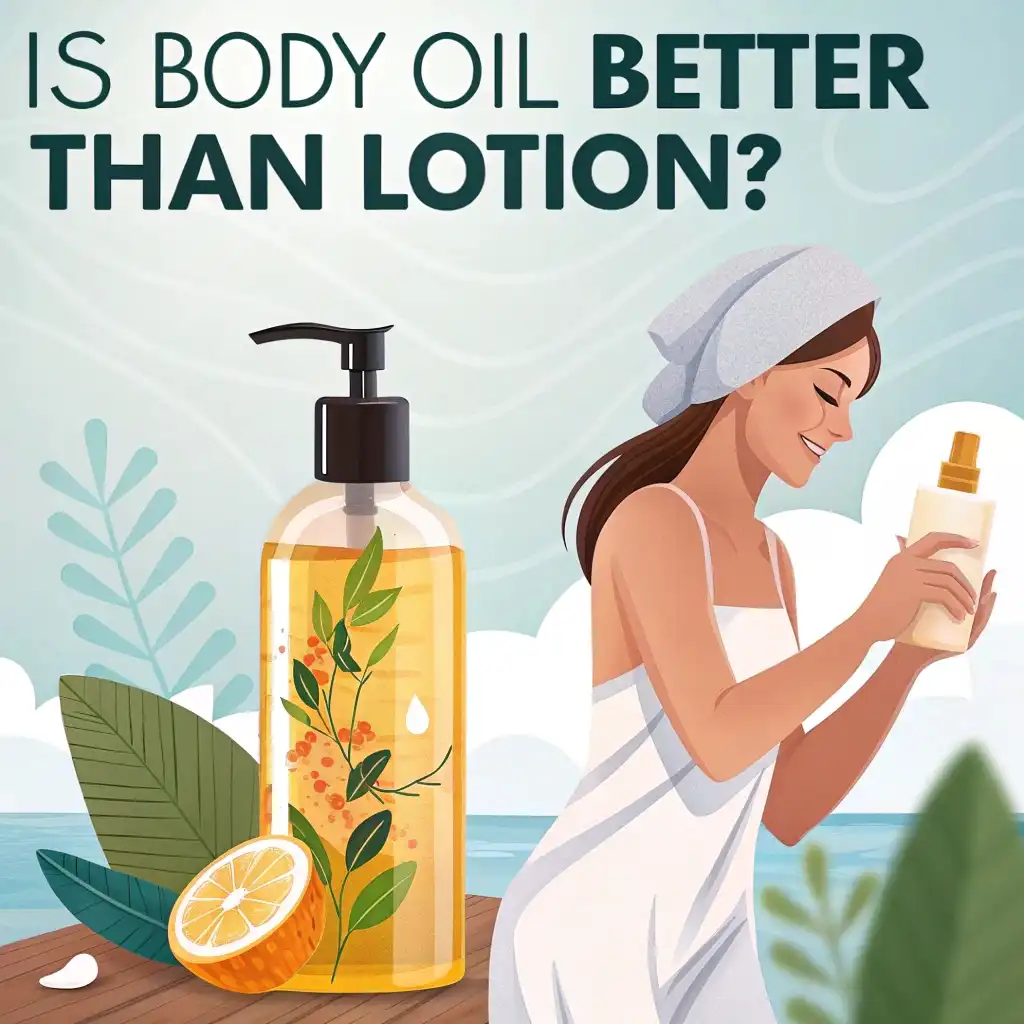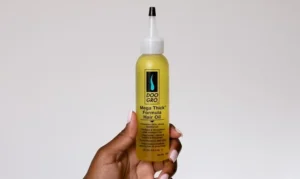Are you stuck trying to pick between body oil and lotion for your skin? I totally get it. Walking down the skincare aisle can feel like a big puzzle.
Both body oil and lotion promise soft, hydrated skin, but they do it in different ways. So, which one wins? Let’s figure this out together!
In this blog post, we’ll look at what makes body oil and lotion special, their benefits, and how they fit into your life.
Key Takeaways
- Body oil comes from natural oils and locks in moisture for a long time. It’s perfect if your skin feels like a desert.
- Body lotion mixes water and oils for a light feel. It suits people with normal or oily skin best.
- Body oil keeps skin hydrated longer by making a shield on the surface.
- Body lotion soaks in fast and works great for everyday use, especially when it’s warm outside.
- Your skin type decides what works for you. Dry skin loves oil, while oily skin prefers lotion.
- Seasons matter too. Use oil in winter and lotion in summer for happy skin.
- Want the best of both? Layer lotion then oil for extra soft skin.
- Oils can feel greasy if you use too much, but they give a nice glow.
- Lotions might need reapplying if your skin gets super dry.
This list sums up the big points we’ll cover. Let’s dive in and explore everything you need to know!
What Is Body Oil?
Body oil is a skincare product made from oils like jojoba, almond, or coconut. These oils have good stuff like vitamins and fatty acids. They help your skin stay healthy.
Body oil has no water, so it feels thick and rich. When you put it on, it makes a layer on your skin. This layer stops moisture from escaping.
People with dry skin love body oil because it hydrates deeply. It also makes your skin look shiny and glowing. I’ve tried it after a shower, and it feels like a treat! You can find simple oils or ones with scents like lavender. Either way, it’s a powerhouse for thirsty skin.
What Is Body Lotion?
Body lotion is a lighter option. It mixes water with oils and other ingredients. The water hydrates your skin fast, and the oils keep that moisture in. Lotions often have extras like glycerin to pull water to your skin. They spread easily and sink in quick. This makes lotion great for daily use.
I like how it doesn’t leave my hands sticky when I’m rushing out the door. It’s perfect if your skin is normal or oily. You can pick lotions for specific needs too, like ones for acne or aging. It’s versatile and feels light, which is why so many people grab it.
How Do Body Oil and Lotion Work?
Body oil and lotion help your skin differently. Body oil makes a barrier on your skin. This barrier traps moisture inside so it lasts longer. Oils also feed your skin with nutrients.
They fix dry patches and make skin strong. Lotion adds water to your skin first. It feels refreshing right away, but the hydration might fade faster.
Oil is like a cozy blanket for your skin, while lotion is a quick splash of water. I’ve noticed oil keeps my elbows soft all day, but lotion is my go-to for a fast morning routine. Both work well, just in their own ways.
What’s Inside Body Oil and Lotion?
Body oil uses natural oils like argan or olive oil. These oils carry vitamins and antioxidants. They help your skin heal and stay smooth. Some oils add essential oils for a nice smell.
Body oil keeps things simple with fewer ingredients. Lotion has water, oils, and stuff to mix them together. It might have preservatives to stay fresh longer.
Some lotions add special ingredients like hyaluronic acid. I love how oils feel pure, but lotions offer more variety. If you like natural products, oil might win. If you want options, lotion has you covered.
Why Choose Body Oil? Top Benefits
Body oil has some awesome perks. It hydrates deeply, sinking into your skin to fix dryness. It’s a lifesaver for rough spots like knees. Oils also smooth out your skin’s texture.
They leave it soft and touchable. If you deal with itchy skin or eczema, oil can calm it down. The barrier it makes protects and soothes. Plus, it gives your skin a pretty glow.
I’ve used oil before a night out, and it makes my legs look amazing! It’s a simple way to feel pampered and keep skin happy.
Why Choose Body Lotion? Top Benefits
Body lotion shines in its own way. It feels light and soaks in fast. You won’t feel greasy, even in summer. It hydrates your skin quickly, which is great for busy days.
I slap it on after a shower and go! Lotions come in formulas for all kinds of skin problems. Some fight acne, others smooth wrinkles.
It’s easy to find one that fits you. The light texture makes it perfect for layering under sunscreen too. If you want no fuss and quick moisture, lotion is your buddy.
Body Oil or Lotion for Dry Skin?
Got dry skin? Body oil might be your hero. It’s thick and keeps moisture in for hours. The barrier it makes stops dryness from coming back.
Oils also heal skin with nutrients. I’ve seen my flaky shins turn smooth with oil. Lotion can help too, but it might not last as long.
If you hate heavy stuff, use lotion in the day and oil at night. Both can team up for super soft skin. For really dry days, oil usually wins the battle.
Body Oil or Lotion for Oily Skin?
If your skin gets oily, lotion is usually better. It’s light and won’t clog your pores. Look for “non comedogenic” on the label to keep breakouts away. Lotions hydrate without adding more oil.
I’ve tried lotion on humid days, and it feels just right. Oils can work too if you pick a light one like jojoba. Jojoba mimics your skin’s oil and balances it. Still, lotion is the safer pick for shine free skin all day.
Can You Mix Body Oil and Lotion?
Yes, you can use both! Layering them works wonders. Put lotion on first to hydrate. Then add oil to seal it in. This combo is perfect for winter when skin gets extra dry.
I’ve done this on cold days, and my skin stays soft till bedtime. Use a little of each so it’s not too heavy. It’s like giving your skin a double dose of love. Try it when you need a hydration boost!
When Should You Use Body Oil or Lotion?
Timing depends on your skin and the weather. In winter, dry air calls for body oil. It keeps skin cozy and hydrated. Summer heat pairs well with lotion’s light feel.
I switch to oil at night for deep care and lotion in the morning for speed. If your skin changes with the seasons, adjust what you use. Both fit into your routine, just pick what feels good when.
How to Use Body Oil Like a Pro
Apply body oil on damp skin for the best results. After a shower, pat your skin so it’s not dripping. Rub the oil in gently. The water helps it soak in and lock moisture.
I love massaging it into my arms—it feels so relaxing! You can also drop some in your bath for a spa vibe. For dry skin, use it morning and night. A little goes a long way, so start small.
How to Use Body Lotion Like a Pro
Put lotion on right after your shower too. Damp skin grabs the moisture best. Spread a thin layer all over. Don’t pile it on, or it’ll feel sticky. I smooth it on my legs and arms in seconds.
If your skin dries out later, add more. Pick a lotion that matches your skin type for the win. It’s quick and keeps you fresh all day.
Body Oil or Lotion for Sensitive Skin?
Sensitive skin needs gentle care. Body oil often works well here. It has fewer ingredients, so it’s less likely to irritate. Go for fragrance free oils like almond or grapeseed.
Lotions can be good too, but check the label. Skip ones with alcohol or strong scents. I’ve used oil on my sensitive spots, and it calms them down. Pick what feels soothing to your skin.
Body Oil or Lotion for Aging Skin?
Aging skin loves both options. Body oil hydrates deeply and boosts elasticity. It can soften fine lines and keep skin plump. Lotions with stuff like retinol help too.
They target wrinkles and firmness. I’ve layered oil over lotion for extra glow, and it works! If aging is your focus, mix and match. Both can keep your skin looking young.
Any Downsides to Body Oil?
Body oil isn’t perfect. It can feel greasy if you overdo it. Use a small amount to avoid that slick look. It takes longer to sink in too.
Oils might stain clothes if you dress too fast. For acne prone skin, it could clog pores. I’ve learned to wait a bit before pulling on jeans. It’s worth it for the hydration, though!
Any Downsides to Body Lotion?
Lotion has flaws too. It might not hydrate enough for super dry skin. You may need to reapply on rough days. Some have ingredients that bug sensitive skin.
I’ve had lotions sting if they’re too scented. Stick to simple ones to dodge that. It’s still a solid pick for quick moisture.
Can Body Oil Replace Lotion?
Body oil can take lotion’s place sometimes. It’s great for dry skin with lasting hydration. If you’re oily, stick to lotion for a lighter touch.
I’ve swapped to oil in winter and loved it. You can use both too, depending on the day. It’s all about what your skin craves.
How to Pick Between Body Oil and Lotion
Choosing is easy when you know your skin. Dry skin picks oil. Oily skin goes for lotion. Sensitive skin likes simple stuff from either.
Think about the season too—oil in cold, lotion in heat. I ask myself if I want rich or light texture. Test both and see what you love!
FAQs
Is Body Oil Better Than Lotion for Dry Skin?
Yes, body oil beats lotion for dry skin. It hydrates deeper and lasts longer with its barrier.
Can I Put Body Oil on My Face?
You can, but use light oils like jojoba. Heavy ones might clog pores.
How Often Should I Use Body Lotion?
Use lotion every day after a shower. Add more if your skin feels dry.
Does Body Oil Help Stretch Marks?
Some oils with vitamin E can improve stretch marks. They boost skin stretchiness.
Is Using Both Body Oil and Lotion Okay?
Totally! Layer lotion first, then oil. It’s a great trick for dry skin.




